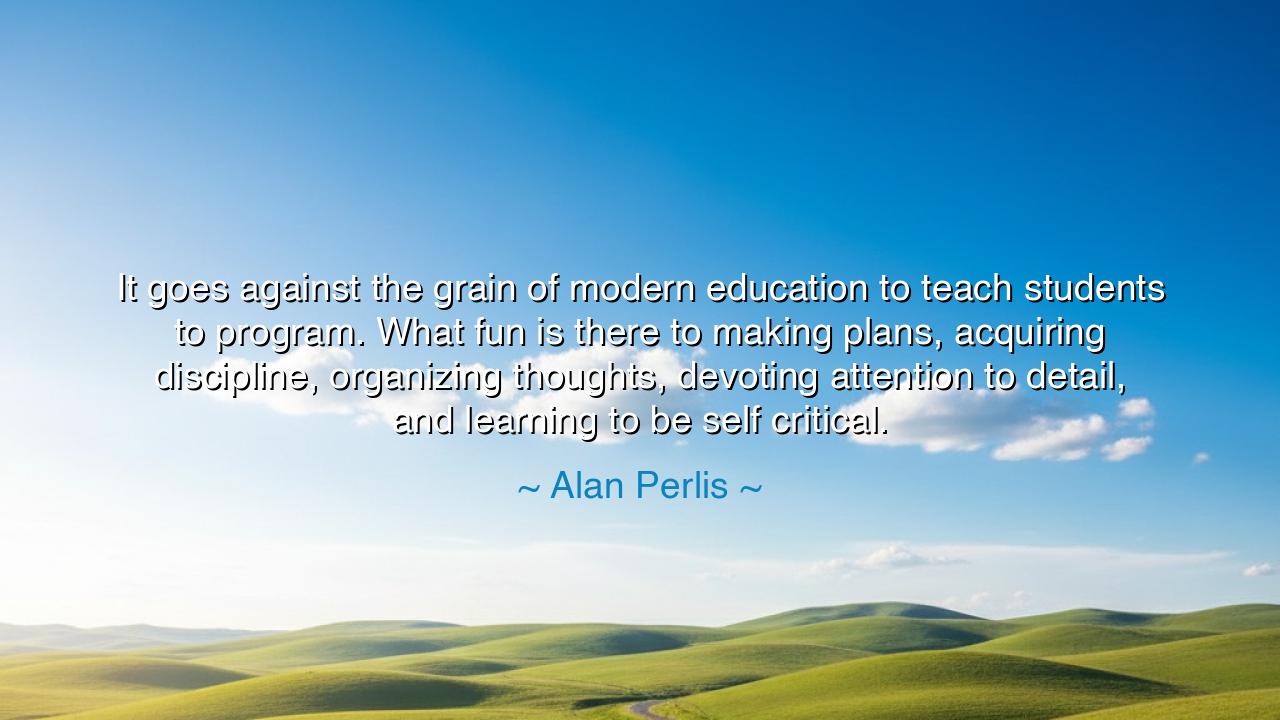
It goes against the grain of modern education to teach students
It goes against the grain of modern education to teach students to program. What fun is there to making plans, acquiring discipline, organizing thoughts, devoting attention to detail, and learning to be self critical.






In the words of Alan Perlis, a pioneer of computer science and a philosopher of the digital age, there lies both irony and wisdom: “It goes against the grain of modern education to teach students to program. What fun is there to making plans, acquiring discipline, organizing thoughts, devoting attention to detail, and learning to be self-critical.” Beneath the humor of these words lies a profound lament for what education has become—and a challenge to restore what it was always meant to be. For Perlis does not mock the act of programming; he celebrates it. What he mocks is the modern education that has forgotten the joy of discipline, the beauty of structure, and the sacred labor of learning to think.
In ages past, to be educated was to be trained not in comfort, but in rigor. The ancients believed that the mind, like iron, must be forged through fire. The student was not a passive vessel to be filled with facts, but an apprentice of thought, learning to shape ideas as the sculptor shapes marble. Perlis, standing at the dawn of the computer age, saw that programming was a return to this ancient art—the art of thoughtful creation. To program is to plan, to order chaos into logic, to see both the forest and the tree. It is to labor with patience, to fail with humility, and to rise with insight. But the modern classroom, he warns, has traded the discipline of thought for the convenience of memorization, the thrill of mastery for the ease of consumption.
He speaks, then, as a reformer, calling us back to the source of all true learning: the struggle for clarity. To write a program is to confront the mind itself. One must organize thoughts, attend to details, revise, and question one’s own reasoning. Every error becomes a teacher; every success, a mirror of one’s patience and precision. But this kind of learning—slow, deep, and humbling—clashes with the modern spirit of haste. The world craves quick results and effortless knowledge, yet the programmer, like the philosopher, knows that the greatest truths come only through discipline and self-critique.
Consider the story of Ada Lovelace, daughter of the poet Byron and the first visionary of computing. She saw in Charles Babbage’s mechanical engine not just machinery, but imagination disciplined by logic. She wrote of “poetical science,” the union of reason and creativity. Her work, though uncelebrated in her time, became the seed of modern programming. Ada understood what Perlis would later proclaim—that true education lies in the marriage of beauty and precision, in the courage to plan, to persevere, to think deeply when others would drift. She found joy not in ease, but in mastery.
In truth, Perlis’s words are not a complaint—they are a prophecy. He saw that the joy of creation comes not from the absence of challenge, but from its presence. The act of programming, like the writing of music or the crafting of philosophy, demands the alignment of hand, mind, and heart. It teaches humility, for the computer obeys only truth. It teaches patience, for every mistake must be understood, not hidden. And it teaches integrity, for clarity cannot be faked. These are the virtues that modern education should nurture—but too often forgets.
And so, his irony cuts deep. “What fun is there,” he asks, in being self-critical, in paying attention, in organizing one’s mind? The answer, of course, is all the fun in the world. For those who have tasted the sweetness of true learning—not the passive absorption of facts, but the active mastery of understanding—there is no greater joy. The pleasure of a mind in motion, of chaos brought to order, of seeing one’s thoughts take shape in a working creation—this is the joy that endures when all others fade.
Therefore, O seeker of knowledge, let this be your lesson: learn to learn, as the ancients did. Do not flee from discipline; embrace it as your companion. Let your mind labor in the details, for that is where truth hides. Be self-critical, for that is how wisdom grows. And whether your tools are pen or code, words or wires, remember that to create with understanding is the noblest act of all.
In the end, Alan Perlis speaks not only to programmers, but to all who seek mastery of their craft. Education must not train the hand alone, but the soul. For in learning to think deeply, to question patiently, to build with purpose, you will find not only knowledge—but freedom. The freedom to shape your own thoughts, your own world, and your own destiny. And that, above all else, is the true joy of learning.






AAdministratorAdministrator
Welcome, honored guests. Please leave a comment, we will respond soon